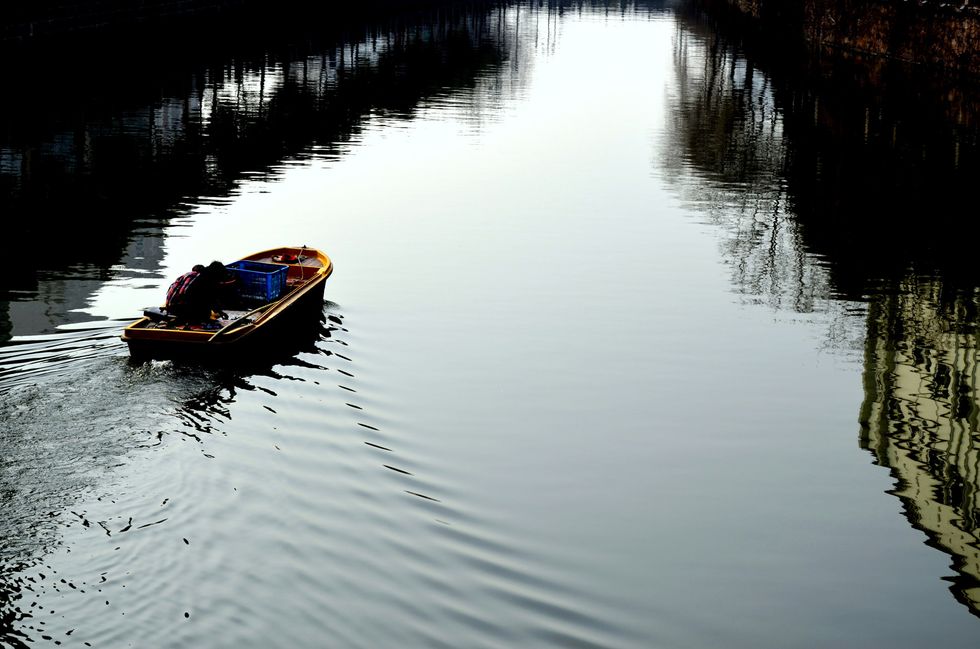During summer, there’s an unspoken emphasis in place --- physical spaces that held memories with protectiveness as if they never went far, impassioned reunions with old colleagues during nights so long that we spun out of proximity. We ran, flew, drove, peddled, all to hold onto something tighter than ever, because we couldn’t imagine free-falling after what seemed like the most epic climb of our lives.
We wanted to grab Rosetta Stone and spoke into another world, and I, like a penniless Tibetan monk searching for her mantra with joints padded in four layers and ready for prostration, realized that my feet could run faster than my thought process. Therefore, I went, 10000 miles away.
This is the summer of places, of inspirations and fervor inside square kilometers. A time I could not help asking myself: What is this higher power that is controlling us?
Growing up, organized religions was like a foreign language like Tibetan or Urdu, practiced by many but never around me. I have listened to empowering lessons by Muslim women about the resistance in her hijab, graciously kowtowed to “Old Man Under the Moon” --- Chinese Buddhism’s cupid --- while imagining an invisible red rope of love through my fists; attended services filled with Christian EDM while paying extra attention to the clinking of quarters in a donation box, and appreciated many gods of Hinduism in a high school history class taught by a golf coach with a southern drawl. During these times, it felt like I was transported to landscapes I did not yet recognize, colors I had never pictured, glistening seashells that I adored but never recollected.
If I am to have a retrospection about those religious experiences, it would be that fervid, communal services for greater deities were the most enlivened in certain spaces. Suddenly, I felt that I could finally forgive my own adventuring feet for being self-righteous and set out to find these landscapes and the stories behind them.
ChengDu, an ancient city in Southwestern China, showed me a glisten of the answer to my question. Here, it called me. I did not expect to find such refuge in the heart of a metropolis, populated by elders who waved fans and told history lessons with dialects so rich you could hear colors, locales who would tell you that they cherished spices more than their lovers, and silent janitors whose Chinese cursive handwritings are so intricate that it made me want to practice street calligraphy with tap water.
Among the best impressions emerged WuHo, a conglomerate of geometric temples that worshipped figures from the Three Kingdoms, a period of turbulent, divisive battles that went on to shape Chinese geopolitics until today.
Constructed beginning in the 5th century, it contained green spaces filled with southern trees and a pond crowded by lily pads, outside a private garden filled with gigantic potted plants that curved their bodies with grace. The property had a schoolyard feel, the statues as teachers and all of China being their pupils.
Walled away from a bustling scene of street vendors, businesswomen, and zooming taxis, WuHo prospered amidst downtown ChengDu, a city with crucial geopolitical history, a hybrid of antiquity and post-Mao reformation, and rich soil that produced enough red peppers that cured the humid heat. This city had a fear of going out of style, "because you couldn't change much in the ChengDu heat", joked the pedestrian.
My mother and I loitered among the temples until past closing time, walking slowly in the corridors below static lanterns and replicas of ancient weapons. Outside, every yard contained giant water vessels with names of generals carved in them, somehow assuring us that this place could never suffer from a fire.
I did not forget to clasp my hands together like a reflex, in front of the statues of people like Zhu GeLiang, Czao Czao, Guan Yu, Liu Bei, characters who fought wars and plotted strategies for military defense in order to give their countrymen a bite to eat, heeded by smaller deities that lived through numerous travels and battles with them.
JinLi District Outside WuHo, a few blocks away, we saw ChengDu in its past-present hybrid form. JinLi district spoke a crispier dialect than most, with intangible cultural heritage laid out on the side of the streets for people to see. Among them were PiYing (Shadow Puppets), a dying artform with complex mechanics behind puppets and a cream-colored film; traditional sugar paintings drawn with one stroke; hand-made wooden instruments that somehow made the air more fragrant from a mile away.
I could hear the heartbeat of Shu, supporting the life of the border between the middle plains of China and Tibetan highlands with ample oxygen, chambers that became more abundant in traditional culture the deeper you explore.
Year after year after year, nothing could stop JinLi from counting the numbers and showcasing them through pepper-filled streets. The olden part of the city of ChengDu was maternal in a ruthless, powerful way ------ I realized that I could not escape her embrace for the rest of my life. It doesn’t take an expert to discover the arteries of a nation-state so fertile that it bred dozens of generations of legendary generals, strategists, scholars, chefs; mystical creatures such as the Phoenix and semi-fabled animals like the giant panda channeled their magic with the engineering wonder that is DuJiang Waterway, a 2500-year-old irrigation system that continues to serve the city today. The central nervous system was held up by modern men and women ------ fearless travelers of life ----- who flooded the streets in search of a place that would provide them with answers to questions they did not even know existed.
From WuHo temple to the heart of the district, it took the voices of two bar singers for me to come to the conclusion that, this higher power existed in places where ordinary citizens took on the narrative of a game changer, where an entire body of people took and worshiped the land while finding the raw beauty within; when souvenirs are being sold for illogical prices in order to make something out of anything; where my mother and I were daring enough to risk being trapped in an ancient temple for the rest of the night just to get to know China; and pieces of dough for small eats ------ dishes after the main course ------ that were turned and tossed so dangerously high that you almost believe that it would drill a hole in the Qing dynasty rocks. I couldn’t begin to fathom how belonged I feel, in this almost-foreign city thousands of miles from the Manchurian port I had grown up in.
My existence suddenly felt holier than traditional Chinese characters, a series of identities just complex enough to be out of reach. On the trip, I learned how to speak a bit of Tibetan later. Yes, I held onto the colors, collected what I could, and found that there were only too many places to affirm greater things. The search continues, but who’s to say? I have found ChengDu.



















